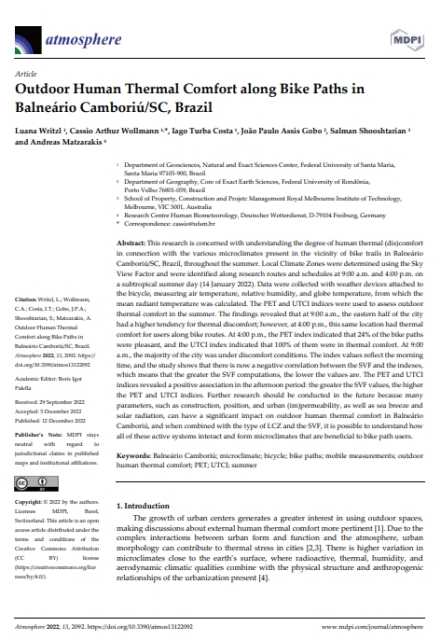Outdoor Human Thermal Comfort along Bike Paths in Balneário Camboriú/SC, Brazil
Tipo de publicação
Artigo
Curso ou área do conhecimento
Geografia
Veículo
Atmosphere
Tipo de autoria
Pessoa Física
Nome do autor
Luana Writzl et alii
Língua
Inglês
Abrangência geográfica
Municipal
País
Brasil
Estado
Santa Catarina
Município
Balneário Camboriú
Ano da publicação
2022
Palavra chave 1
Clima
Palavra chave 2
Conforto
Palavra chave 3
litoral
Palavra chave 4
Saúde
Palavra chave 5
Sistema cicloviário
Descrição
This research is concerned with understanding the degree of human thermal (dis)comfort in connection with the various microclimates present in the vicinity of bike trails in Balneário Camboriú/SC, Brazil, throughout the summer. Local Climate Zones were determined using the Sky View Factor and were identified along research routes and schedules at 9:00 a.m. and 4:00 p.m. on a subtropical summer day (14 January 2022). Data were collected with weather devices attached to the bicycle, measuring air temperature, relative humidity, and globe temperature, from which the mean radiant temperature was calculated. The PET and UTCI indices were used to assess outdoor thermal comfort in the summer. The findings revealed that at 9:00 a.m., the eastern half of the city had a higher tendency for thermal discomfort; however, at 4:00 p.m., this same location had thermal comfort for users along bike routes. At 4:00 p.m., the PET index indicated that 24% of the bike paths were pleasant, and the UTCI index indicated that 100% of them were in thermal comfort. At 9:00 a.m., the majority of the city was under discomfort conditions. The index values reflect the morning time, and the study shows that there is now a negative correlation between the SVF and the indexes, which means that the greater the SVF computations, the lower the values are. The PET and UTCI indices revealed a positive association in the afternoon period: the greater the SVF values, the higher the PET and UTCI indices. Further research should be conducted in the future because many parameters, such as construction, position, and urban (im)permeability, as well as sea breeze and solar radiation, can have a significant impact on outdoor human thermal comfort in Balneário Camboriú, and when combined with the type of LCZ and the SVF, it is possible to understand how all of these active systems interact and form microclimates that are beneficial to bike path users […]



 Ao navegar no Observatório da Bicicleta você concorda com os
Ao navegar no Observatório da Bicicleta você concorda com os